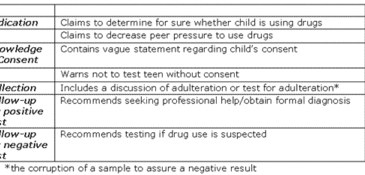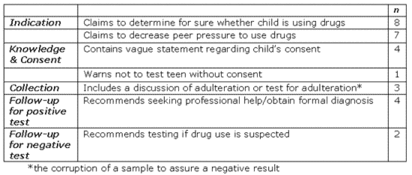The Internet is an unregulated marketplace for drugs and
drug-testing products. In the last issues of STASH 3(3), 3(4), we reviewed studies
examining Internet accessibility of illicit drugs (e.g., opioids, ecstasy), and
Internet information about these illicit drugs. Internet sites also make
available products that claim to test illicit drug use. This week’s STASH
reports a study that examined whether Internet based home-drug testing sites
provide complete and accurate information for parents who decide to test their
teenagers’ for drug use (Levy, Van Hook, & Knight, 2004).
Levy, Van Hook, and Knight (2004) conducted Internet
searches for home drug-testing and selected for further analyses eight sites
containing parental advice sections. Two of the authors reviewed the content of
each site and noted the product claims, the possibility of inaccuracy, as well
as advice to the parents concerning follow-up procedures.
Table 1 shows that all eight of the home drug testing kits
claimed that their products would reveal whether a child used drugs, but only
three discussed the potential for false negative or false positive findings. The
majority of the sites claimed that home drug testing can reduce the effects of
peer pressure. One site explicitly warned parents not to test their children
without consent. Half of the sites stressed the importance of parents consulting
a medical professional about test results and/or teen behavior.
Figure. Content of Internet based Home Drug-testing Sites (Adapted from Levy, Van Hook, & Knight (2004, p. 724). Click image to enlarge.
This study has some limitations. The current study only
reviews home drug-testing websites with specific parental advice sections;
consequently, these sites might not be representative of all of Internet home
drug-testing websites. Although this study employed a small sample, the findings
suggest that many Internet-based home drug-testing kits do not provide parents
with essential information, for example, about the risks of false positive and
false negative tests, specimen collection procedures, or the importance of
consulting a health professional.
Given the complex nature of drug testing, health
professionals should advise parents of the limitations and risks associated with
these tests. Similarly, parents who choose to purchase these products should use
extreme caution. Finally the results of this study suggest a need to regulate
these and similar sites that claim to provide health related information and
resources.
What do you think? Please use the comment link below to provide feedback on this article.
References
Levy, S., Van Hook, S., & Knight, J. (2004). A Review of
Internet-Based Home Drug-Testing Products for Parents. Pediatrics, 113(4),
720-726.





